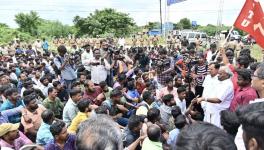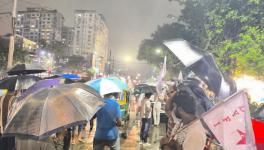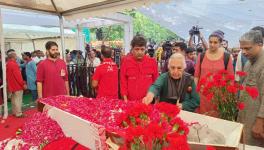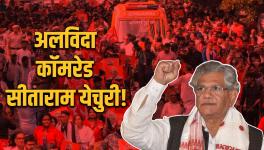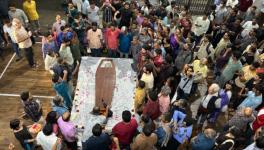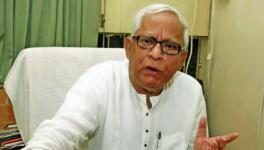TN: 25 Years Since Melavalavu Massacre, Dalit Community Continues to Face Intimidation and Suppression.
Leaders of CPI(M), VCK and TNUEF paying respect to the Melavalavu martyrs on June 30.Leaders of CPI(M), VCK and TNUEF paying respect to the Melavalavu martyrs on June 30.
Tamil Nadu: K Murugesan, the president of Melavalavu panchayat and five of his colleagues, all belonging to the Scheduled Caste (SC) community were hacked to death on June 25, 1997 in broad daylight in a moving bus. The crime they committed was contesting the local body elections in the reserved panchayat against the wishes and whims of the dominant caste.
The convicted individuals were released based on ‘good conduct', which inflicted further pain to the families of the bereaved. Only Tamil Nadu Untouchability Eradication Front (TNUEF) staged a road blockade against the release while most political parties were tight-lipped owing to electoral calculations.
Even after 25 years, Government's approach towards the Dalits rising to power has not changed much. The state has made no initiative to address the threats and challenges faced by them. People assemble at the memorial every year to pay respect to the martyrs, but their sacrifices have not been respected.
The Melavalavu village is no exception, simmering with communal tensions after the communities planned to restart the ‘Manju Viratuu’ or Jallikattu festival- which was stalled for a while following the murders.
The obsession with power and casteism remain the biggest hurdles in empowering the Dalit community, despite several legislations- including reservations and punishments, being in place. However, they remain only on paper and not in practice.
25 YEARS SINCE THE BRUTAL MURDERS
The Kallar community, one among the three subsects of the Mukkulathor caste is the dominant group in the Melavalavu village, as is the case in several districts in south Tamil Nadu. The village is also home to a few backward castes along with the Paraiyars, who fall under the scheduled caste (SC) group.
When the panchayat was reserved for the SC community as per the Tamil Nadu Panchayats Act 1994, the Kallar community was unable to accept Dalits as their leaders, since the Dalits were enslaved for decades by the dominant caste.
The election was postponed twice due to booth capturing and related incidents but was held successfully in December 1996. Before the elections, the ‘Oor Kootam’ (a system similar to Khap panchayat) ordered the Dalits to refrain from contesting.
“The members of the dominant caste wanted their hand-picked people to win. Those who were prepared to contest received death threats continuously”, said T Chellakannu, president of the TNUEF.
Braving all odds, Murugesan and five of his friends won the elections. Barely six months into office, the six of them were returning to the village from Melur after lodging a complaint with the District Collector about the attacks on Dalit households.
“The bus in which they travelled was stopped midway and all six were hacked to death. The assailants beheaded Murgesan and threw his head into a well half a kilometre away”, Chellakannu said.
Unfortunately, most mainstream political parties refrain from visiting the memorial except for the Communist Party of India (Marxist) and Viduthalai Chiruthaigal Katchi (VCK) along with TNUEF- an organisation fighting for the protection of Dalit rights.
Before the Melavalavu massacre, a twin murder took place in Chennagarampatti village in 1992 when the dalit community demanded share on income from the 250 acres property.
FIVE MEN RECEIVE DEATH THREATS NOW
In a repeat of 1997, five men belonging to the Dalit community received anonymous letters threatening them with death, after attempts to restart the Manju Virattu festival were cancelled. The letter threatened to kill them and expressed no fear of facing trial, hinting that the wealth they possess would help them escape punishment.
The villagers, with the consent of all the communities, had decided to start the festival, in a bid to restore communal harmony. “When the Dalit community was approached, they demanded the right to participate in the festival, which has been denied for decades”, K Samuvel Raj, President of the TNUEF, told NewsClick.
The proposal was accepted by the heads of the communities but was vehemently opposed by the members of the communities which included Kallars and Konars/Yadavas.
“After tension prevailed, the district administration suspended the conduct of Manju Virattu. All the arrangements were made including the installation of pandals spending lakhs of rupees”, Chellakannu said.
A team of office bearers of TNUEF visited the village on June 5, following the reports of death threats and the cancellation of the bull taming event.
“The Dalit men fear for their lives since similar events have taken place a couple of decades ago. They shared the letter they received via post about taking revenge”, Chellakannu further added.
The instances of Dalits being intimidated, even if they become elected representatives of the local bodies, continue to rise.
HAS THE STATE INTERVENED?
The TNUEF has accused the state governments of neglecting the struggles faced by the elected local body representatives.
The state government and state election commission can hold elections to reserved local bodies, unlike in the late 90's, when holding elections was close to impossible. Few local bodies went on without elections for several years.
"The state and election commission can hold elections to reserved local bodies now, which is the only visible change," Samuel told NewsClick.
Expressing disappointment over the lack of political will in countering the plights of Dalit representatives, Samuel added, "the sacrifice of the martyrs are not being respected in the way they should have been. Nothing is being done apart from laying tributes at the memorial".
TNUEF has been calling for a mechanism to address the concerns raised by the representatives of the dalit community.
Samuel said, "the Dalit presidents are unable to hoist the national flag, get a chair in the panchayat meetings, and are even unable to have their names written on the display boards. Is this the empowerment the government wants? Only continuous efforts to create awareness about the illogical caste system and scientific temper can yield positive outcomes".
The Melavalavu incident will be remembered as one of the most brutal killings of an elected panchayat President and councilors. But the caste strata and the discriminatory system prevail in different forms.
"A Dalit panchayat president can function freely only if the same community enjoys a majority there. Else, the vice president or any other dominant individual carries out their duties. We are far away from learning lessons from the Melavalavu massacres, which is a shame on the civilised society", Samuel concluded.
Get the latest reports & analysis with people's perspective on Protests, movements & deep analytical videos, discussions of the current affairs in your Telegram app. Subscribe to NewsClick's Telegram channel & get Real-Time updates on stories, as they get published on our website.













